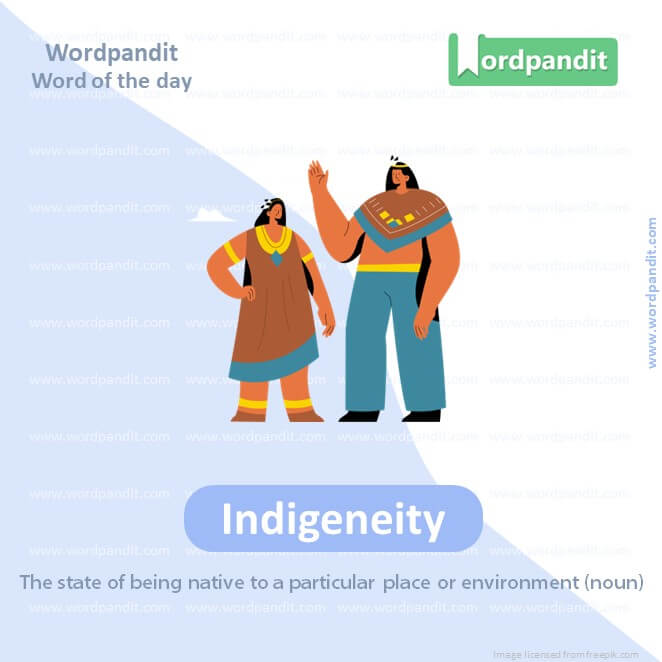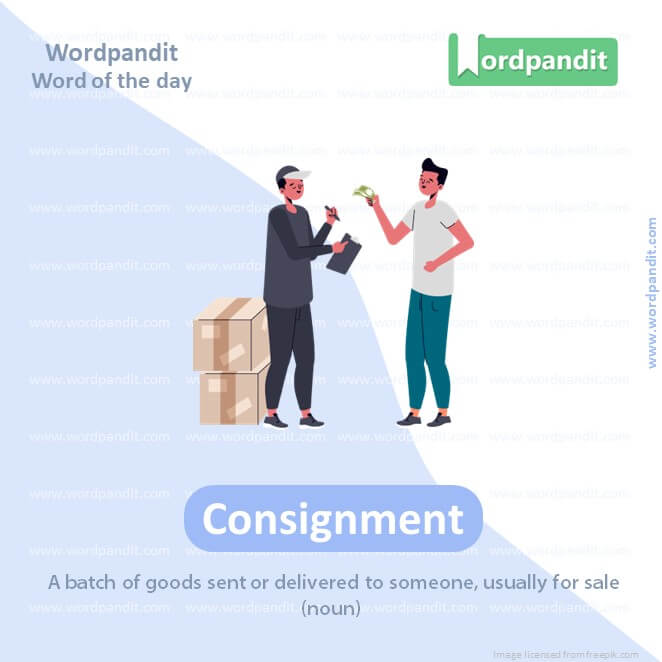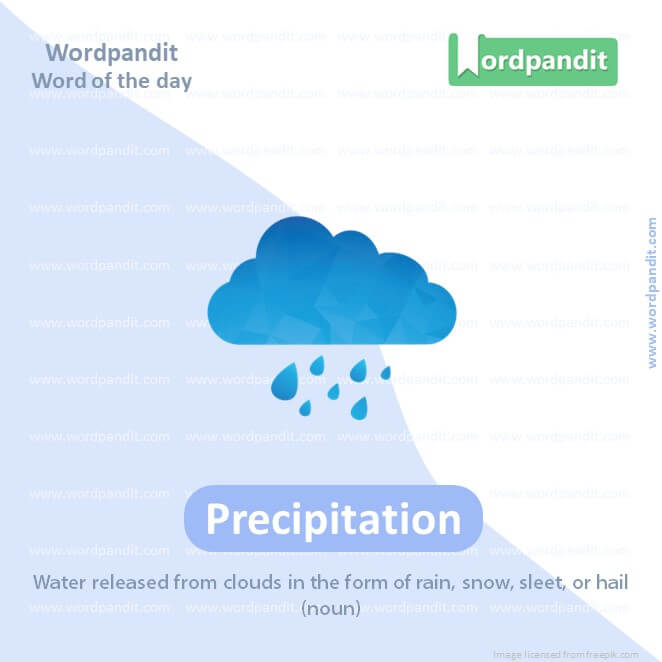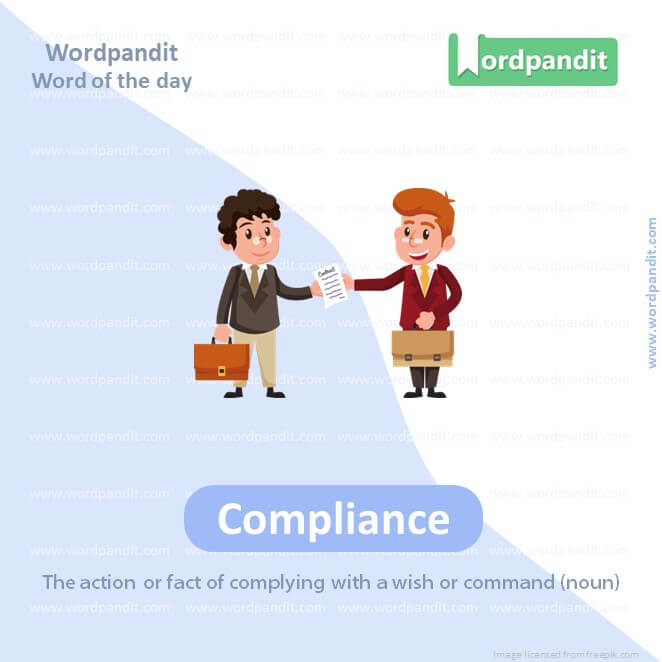Daily Vocabulary Words: List of Daily Used Words in Leading Indian Newspapers
Hi there. Welcome to this special section @ Wordpandit. Our endeavour here is straightforward: highlighting daily vocabulary words that you would come across in leading newspapers in the country. We have included the following newspapers in our selection:
• The Times of India
• The Economic Times
• Hindustan Times
• Mint
• Indian Express
We are putting in extensive work to develop your vocabulary. All you have to do is be regular with this section and check out this post daily. This is your repository of commonly used words; essentially, we are posting a list of daily used words. Hence, this has significant practical application as it teaches you words that are commonly used in leading publications mentioned above.
Visit the website daily to learn words from leading Indian newspapers.

WORD-1: Indigeneity
CONTEXT: To appreciate why JPS and his brand of indigenous knowledge will be missed we only have to look at what passes in the name of indigeneity today.
SOURCE: Indian Express
EXPLANATORY PARAGRAPH: Indigeneity is like being part of the very first family of a place. Imagine your family has always lived in the same house for many, many years, even before you were born. Indigeneity is like that, but for people who were the first ones to live in a certain country or area.
MEANING: The state of being native to a particular place or environment (noun).
PRONUNCIATION: in-dih-juh-NEE-uh-tee
SYNONYMS: Nativeness, Aboriginality, Autochthony, Endemism, Native Status
USAGE EXAMPLES:
1. The indigeneity of the people was evident in their traditional clothing and customs.
2. Celebrating indigeneity helps us understand and respect the first inhabitants of a place.
3. The museum had exhibits dedicated to the indigeneity of the local tribes.
4. The conference focused on preserving the languages and cultures associated with indigeneity.
WORD-2: Encapsulated
CONTEXT: The word meant something crucial and specific to him; in fact, it encapsulated his intellectual manifesto.
SOURCE: Indian Express
EXPLANATORY PARAGRAPH: Encapsulated is like putting something important into a small, safe bubble. Imagine you have a special toy that you want to keep safe, so you put it inside a little clear ball. That’s like encapsulating it, keeping it protected and separate.
MEANING: To enclose or be enclosed in a capsule or protective layer (verb).
PRONUNCIATION: en-KAP-suh-lay-ted
SYNONYMS: Enclosed, Enveloped, Cocooned, Encased, Wrapped
USAGE EXAMPLES:
1. The medicine was encapsulated in a gelatin shell.
2. The artist encapsulated his feelings in his painting.
3. The history of the era was encapsulated in a single book.
4. The report encapsulated the main points of the discussion.

WORD-3: Consignment
CONTEXT: Vehicles will have to be more expensive (think of iron rods or glass being transported while half of the consignment is protruding out of the vehicle or overcrowded school vans ferrying children), properly vetted drivers will demand a higher premium and last but not least, fares and freight charges will have to increase.
SOURCE: Hindustan Times
EXPLANATORY PARAGRAPH: Consignment is like when you send a package somewhere. Imagine you have a box full of toys that you want to send to your friend. You give it to someone who can deliver it, and that’s sending a consignment.
MEANING: A batch of goods sent or delivered to someone, usually for sale (noun).
PRONUNCIATION: kuhn-SINE-muhnt
SYNONYMS: Shipment, Delivery, Dispatch, Cargo, Freight
USAGE EXAMPLES:
1. The consignment of clothes arrived at the store today.
2. He sent a consignment of books to the library.
3. The consignment was delayed due to bad weather.
4. They received a large consignment of toys just before Christmas.
WORD-4: Protruding
CONTEXT: Vehicles will have to be more expensive (think of iron rods or glass being transported while half of the consignment is protruding out of the vehicle or overcrowded school vans ferrying children), properly vetted drivers will demand a higher premium and last but not least, fares and freight charges will have to increase.
SOURCE: Hindustan Times
EXPLANATORY PARAGRAPH: Protruding is like sticking out. Imagine you have a bookshelf and one book is sticking out more than the others. That book is protruding, which means it’s not in line with the rest.
MEANING: Sticking out from a surface or edge (verb, also used as an adjective).
PRONUNCIATION: proh-TROO-ding
SYNONYMS: Jutting, Extending, Bulging, Poking, Overhanging
USAGE EXAMPLES:
1. The branch was protruding into the path.
2. He noticed a nail protruding from the wall.
3. Her backpack was so full that books were protruding out of it.
4. The rocks were protruding through the surface of the water.

WORD-5: Precipitation
CONTEXT: The truck drivers’ strike is neither the first nor will it be the last precipitation on this front.
SOURCE: Hindustan Times
EXPLANATORY PARAGRAPH: Precipitation is water that falls from the sky in different forms like rain, snow, or hail. It’s like when you’re outside, and suddenly water drops start falling from the clouds. That’s precipitation!
MEANING: Water released from clouds in the form of rain, snow, sleet, or hail (noun).
PRONUNCIATION: pre-sip-i-TAY-shuhn
SYNONYMS: Rainfall, Snowfall, Drizzle, Downpour, Sleet
USAGE EXAMPLES:
1. The weather forecast predicted heavy precipitation tomorrow.
2. The area received a month’s worth of precipitation in just a few days.
3. Farmers depend on regular precipitation for their crops.
4. The precipitation turned into snow as the temperature dropped.
WORD-6: Postulating
CONTEXT: The EU Declaration on Development on November 22, 2021, privileges a human rights-based approach to development, postulating respect for human rights as “a precondition for the achievement of inclusive and sustainable development”.
SOURCE: Indian Express
EXPLANATORY PARAGRAPH: Postulating is like making a really good guess or suggestion about something, even if you don’t have all the facts. It’s like when you think your friend has a surprise for you because you see them hiding something, but you’re not sure.
MEANING: To suggest or assume the existence, fact, or truth of something as a basis for reasoning or discussion (verb).
PRONUNCIATION: PAHS-chuh-lay-ting
SYNONYMS: Hypothesizing, Assuming, Presuming, Theorizing, Speculating
USAGE EXAMPLES:
1. The scientist was postulating a new theory.
2. He postulated that there must be a simpler solution.
3. Her argument was based on postulating that all humans want to be happy.
4. Postulating a connection, she began her research.
WORD-7: Abbreviated
CONTEXT: The use of unmanned lethal autonomous weapons systems, abbreviated in an unconscious irony by the US Defence Department as LAWs, illustrates complete machine-learning dependence and dehumanisation of the means of warfare, setting back the project of international humanitarian law.
SOURCE: Indian Express
EXPLANATORY PARAGRAPH: Abbreviated is like making something shorter. Imagine you have a long name, but you like to use a shorter version of it. That shorter version is an abbreviated form of your name.
MEANING: Shortened or reduced in length or duration (verb, also used as an adjective).
PRONUNCIATION: uh-BREE-vee-ay-ted
SYNONYMS: Shortened, Condensed, Truncated, Summarized, Abridged
USAGE EXAMPLES:
1. She used an abbreviated form of her name on her badge.
2. The meeting was abbreviated due to time constraints.
3. He gave an abbreviated account of the event.
4. The article was too long, so it was abbreviated for publication.

WORD-8: Compliance
CONTEXT: the government were to successfully address regulation failure, one must accept the fact that compliance with such regulations will lead to a huge increase in the cost of road transport in the country.
SOURCE: Hindustan Times
EXPLANATORY PARAGRAPH: Compliance is like following rules or doing what you’re told. Imagine your teacher has rules in the classroom, like raising your hand to speak. When you do that, you’re showing compliance with the rules.
MEANING: The action or fact of complying with a wish or command (noun).
PRONUNCIATION: kuhm-PLY-uhns
SYNONYMS: Adherence, Conformity, Obedience, Accordance, Submission
USAGE EXAMPLES:
1. The company was noted for its strict compliance with safety regulations.
2. Compliance with the new law was mandatory.
3. They performed a check to ensure compliance with the standards.
4. The school emphasized compliance with its code of conduct.
WORD-9: Segregating
CONTEXT: the most difficult when it comes to segregating high-cost and low-cost consumers from using transport.
SOURCE: Hindustan Times
EXPLANATORY PARAGRAPH: Segregating is like separating things into different groups. Imagine you have a box of crayons and you decide to put all the red ones in one place and all the blue ones in another. That’s like segregating them.
MEANING: To set apart from others or from the main group (verb).
PRONUNCIATION: SEG-ri-gay-ting
SYNONYMS: Separating, Dividing, Isolating, Partitioning, Disassociating
USAGE EXAMPLES:
1. The system was segregating the data into different categories.
2. They were segregating the recyclable materials from the trash.
3. Segregating plants by type helps in better garden management.
4. The policy was criticized for segregating students based on ability.

WORD-10: Cosmopolitanism
CONTEXT: the new fashion of a false cosmopolitanism and false humanitarianism” that nevertheless reproduces the old power relations between the imperial West and the rest.
SOURCE: Indian Express
EXPLANATORY PARAGRAPH: Cosmopolitanism is like being a friend to the whole world. Imagine if you liked learning about different places, trying foods from all over, and making friends with people who come from different countries. That’s like being cosmopolitan.
MEANING: The idea that all human beings belong to a single community, based on a shared morality (noun).
PRONUNCIATION: koz-mo-puh-LI-tuh-niz-uhm
SYNONYMS: Worldliness, Sophistication, Universalism, Multiculturalism, Globalism
USAGE EXAMPLES:
1. Her cosmopolitanism was evident in her diverse group of friends.
2. The city’s cosmopolitanism made it a vibrant and exciting place.
3. He promoted cosmopolitanism in his teachings.
4. The festival celebrated the cosmopolitanism of the region.
Vocabulary Pronunciation
The dance of language learning comprises two inseparable partners: vocabulary and pronunciation. The rhythm of this dance is best enjoyed when both partners are in sync. Essentially, mastering ‘vocabulary pronunciation’ is key to expressing and understanding a language effectively. However, what is the ideal approach to learn ‘vocabulary pronunciation’?
Firstly, the process of learning ‘vocabulary pronunciation’ isn’t a sprint. Rather, it’s a marathon where consistency is vital. A gradual and steady pace of learning new words and their pronunciation offers enough time to effectively practice and commit them to memory.
Secondly, to master ‘vocabulary pronunciation’, go beyond written text. Dwell in the world of audible language, such as documentaries, podcasts, music, or language-learning apps that provide pronunciation guides. These memorable auditory experiences aid in refining your ‘vocabulary pronunciation’ and offer a glimpse into the authentic sounds of the language.
Another beneficial strategy for learning ‘vocabulary pronunciation’ involves the use of phonetic transcriptions. They offer systematic approaches to understanding the sound system of a language, thereby improving pronunciation.
Most importantly, do not shy away from practicing your ‘vocabulary pronunciation’. Be it in a language exchange meeting, a conversation with a native speaker, or even a self-recording session, active verbalization massively boosts your pronunciation prowess.
Lastly, always remember to train your ears as much as you train your tongue. Listening carefully to native speakers helps you capture the subtleties of ‘vocabulary pronunciation’, contributing to better delivery when you speak.
In conclusion, mastering ‘vocabulary pronunciation’ is not an overnight journey. It’s a process of intentional practice, sustained listening, conscientious reflection and active usage. As you chart this course with diligence and patience, you will witness your ‘vocabulary pronunciation’ skills blossom, leading you to communicate with greater fluency and confidence.













